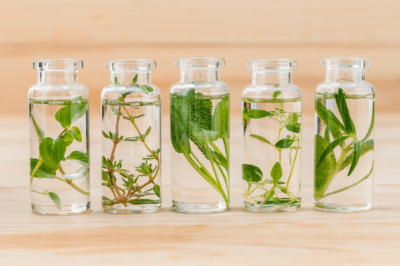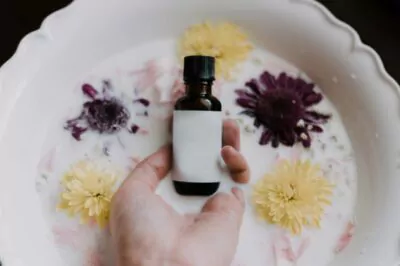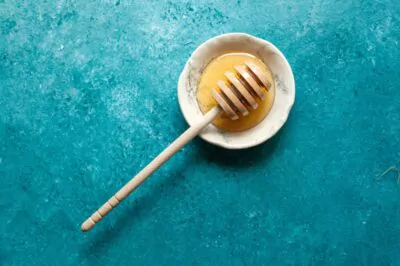No doubt you’ve experienced it. You walk into someone’s home, through an old forest, or alongside the river, and suddenly you’re not there anymore. The scents around you have transported you to another time in your past, and you can’t help but pause, because the sensation is so powerful.
Indeed, our sense of smell is said to be the most successful of all senses in triggering emotions and memories. It’s the only one that goes directly to the amygdala and hippocampus in the brain—areas strongly linked to emotion and memory. Visual, auditory, and tactile messages don’t go through these brain areas.
Aromatherapy—the practice of using essential oils extracted from plants for health benefits—takes advantage of that direct line between scent and emotion to help ease stress, boost energy, and more. It also incorporates the use of these oils applied topically to the skin, through massage, aromatic baths, or other treatments to not only benefit the skin, but to potentially soothe.
Does it really work? Can our sense of smell be harnessed in such a way as to improve our well being?
Where Aromatherapy Came From
The practice of using plant materials for their scent goes back thousands of years. Hippocrates, the father of medicine, is said to have recommended a daily aromatic bath and scented massage for good health. Pedanius Discorides, a Greek doctor who died in 90 A.D. and who wrote a 5-volume encyclopedia on herbal medicine called De Materia Medica, described many of health benefits of herbs and essential oils, including myrrh, fennel, juniper, cinnamon, and rosemary.
The Persians are credited with the distillation of essential oils in the 10th century, though it’s believed other ancient cultures were doing the same long before that. In India, where Ayurvedic medicine has long been popular, practitioners used the healing benefits of essential oils for thousands of years. By the 16th century, Germany was considered the center of aromatherapy research, with physician Hieronymus Braunschweig writing several books on the topic.
The term “aromatherapy” was believed to be invented by French chemist René-Maurice Gattefossé in the early 1900s, after he used lavender oil. He later wrote and published a book on the subject that is still in print today: Gattefossé’s Aromatherapy. A few decades later, French army surgeon Dr. Jean Valnet wrote The Practice of Aromatherapy, which was translated into English in 1964.
More modern times have brought aromatherapy into the science lab, where researchers have poked and prodded essential oils to see just what benefits they may have. They have found over and over again that essential oils do have the unique abilities.
What Kind of Aromatherapy?
The term “aromatherapy” can be confusing sometimes. Are we talking about inhaling the scents of these oils, or about the use of essential oils for health benefits in general?
Most of the time when people talk about aromatherapy, they’re referring either to inhalation of the scent or the topical application of a diluted essential oil. We’re not talking about ingesting the oils, though some studies are looking into that possibility.
But for this post, we’re talking strictly about inhalation or topical application:
- breathing in the oils through the use of steam or an infuser
- breathing them in directly from an individual inhaler
- inhaling the scent from oil placed on a cotton ball or cloth
- aromatherapy massage
- aromatherapy lotions and dressings
How Scent Affects Us
Can scents really affect us?
Though we don’t have a lot of studies on the subject yet, some research has given us some clues into the connection between the nose and the brain. Rachel S. Herz, assistant professor of psychology at Brown University, stated in an interview with Scientific American that odors can affect us based on our experience. In other words, if you have fond memories of your grandmother’s vanilla cookies, the scent of vanilla may help transport you back to that time when you felt cared for and nurtured.
Similarly, scents you were exposed to when you experienced something not so positive will likely elicit the same response when you smell them again. If you ended up in the hospital as a child, for example, the scent of bleach may forever bring you back. Herz states that no other sense has this intimate a link between emotion and learning, which is why odors tend to trigger emotions.
Research by Nicole Hovis and Theresa White of Le Moyne College in New York shows that scent can influence our first impressions of a person. In their study, they had participants sniff either lemon or onion or no scent at all while standing near a gender-neutral silhouette. Participants were more likely to perceive the silhouette as male when smelling onion, and female when smelling lemon.
Another set of studies reported that floral scents were associated with happiness. Participants were asked to write about life events while in a room perfumed with floral smells, classic synthetic perfumes, or baby powder. They used about three times as many happiness-related words when in the florally scented room.
Scents Can Influence Our Spending Habits, and Our Dreams, and Our Perceptions
Other studies have found that scents can have a powerful influence on what we do. A study from the Chicago University, for example, found that participants valued a pair of shoes more attractive, and were more likely to value it at a higher price, when in a room with a pleasant aroma, as opposed to a room with no smell.
In another study from the University of Heidelberg, participants exposed to the smell of flowers had more pleasant dreams than those exposed to no smell. (No surprise that those exposed to a sulphur smell before sleep had the most negative dreams!)
Another study found that volunteers who sniffed grapefruit aromas judged women to be five years younger than they were. (Anti-aging trick, ladies!) In a related study, women who wore perfumes with floral or spice notes were judged to be four pounds less, on average, than those wearing other aromas or no scent at all. If the men described the scent as pleasant, they rated the women to be about 12 pounds lighter.
Because our olfactory receptors are directly connected to the limbic system, which is considered the seat of emotion, we can even be said to be slaves to our noses. Anytime we smell something, we’re stimulating the deepest parts of our brains, and our emotions aren’t far behind. On the whole, we know from experience that pleasant fragrances can calm your mind, while negative scents can turn a good day sour in a hurry.
Current research shows, however, that much of how we feel about a scent is programmed into us by our history. That means that aromatherapy can become a very personal thing.
Whereas floral fragrances may make most people feel happy, according to studies, if you grew up smelling roses every time you had a stomachache, it’s likely you won’t feel the same way. Farmers, for instance, are likely to associate the scent of cow manure with strong feelings of nostalgia, whereas city dwellers may be hard pressed to imagine how such an association would be possible!
Own Your Aromatherapy
From what we know so far, because aromas are so personal, you can really have fun designing your own aromatherapy practice. If you haven’t tried it yet, now may be the time to start. Here are five easy ways to incorporate your favorite scents into your day:
- Add a few drops to your bath water and breathe deeply.
- Place a few drops on your pillowcase, or use a cotton ball.
- Blend your favorite oil with a carrier oil like sunflower, olive, or sweet almond and use it for a hand, foot, leg, or back massage.
- Simmer some of your favorite oils in water on the stove.
- Add a couple drops to a tissue, vacuum it up, and then vacuum the rest of your house, all while disseminating a healing scent!
Click here for more ideas on how to use essential oils.
Does aromatherapy work for you? Please share your experience in the comments below!
Sources:
The Telegraph – Smells Can Trigger Emotional Memories, Study Finds
Alliance of International Aromatherapists – Brief History of Aromatherapy
Scientific American – Do Scents Affect Peoples’ Mood of Work Performance?
Live Science – Smell of Success: Scents Affect Thoughts, Behaviors
Saga Magazine – How Smell Affects Your Body and Mind
Green Med Info – The Aroma of Peppermint Enhances Memory and Increases Alertness in Human Subjects
American Psychological Association – Scents and Sensibility








Leave a Reply